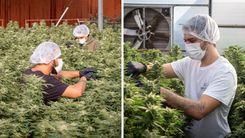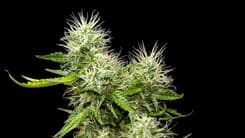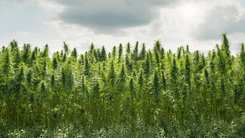Use of cannabinoids in animal production can increase well-being and productivity, says Embrapa researcher
Veterinarian argues that cannabis derivatives reduce stress and strengthen immunity in pigs and poultry; lack of regulation is still a hurdle
Published on 08/11/2025

Veterinarian and researcher at Embrapa Suínos e Aves, José Rodrigo Pandolfi, during the 4th Brazilian Medicinal Cannabis Congress. Image: Sechat Archive
Cannabis and its derivatives can improve productivity in poultry and pig farming. This is the hypothesis advocated by the veterinarian and researcher at Embrapa Suínos e Aves, José Rodrigo Pandolfi.
“The use of cannabis derivatives, more specifically cannabidiol (CBD), allows for production with less stress, greater well-being, healthier animals, and, consequently, higher productivity. That's our hypothesis”, stated Pandolfi during the 4th Brazilian Medicinal Cannabis Congress.
Pandolfi explains that cannabinoids have antimicrobial, anti-inflammatory, immunomodulatory, analgesic, and stress-reducing properties. These characteristics already have support in scientific literature with other species and can also be applied to poultry and pig production chains.
These mechanisms, according to the researcher, have the potential to strengthen a sector that produced 15 million tons of chicken meat in 2024. Of this total, 64.7% supplied the domestic market and 35.3% were exported, according to data from the Panorama and Perspectives on Brazilian Poultry and Swine Farming report.
In the case of pork, more than 5 million tons were produced, with 74.7% destined for the domestic market and 25.3% for export.
Follow the interview with Pandolfi:
The context of poultry and swine farming in Brazil
Poultry and swine farming are strategic activities of national zootechnics, focused on meat and egg production. Poultry farming is divided between broiler chicken production and laying hens for egg production.
Swine farming involves the entire production cycle, from breeding to animal finishing, with a focus on proper feeding, health, and management.
These mostly confined farming systems expose animals to stressful situations, which can reduce immunity and favor the emergence of pathogens, according to the Embrapa researcher.
Studies indicate the feasibility of CBD use
In the review article “Cannabinoids and their potential applications in poultry and other animal production chains,” Pandolfi highlights that the gradual removal of antimicrobials in animal production poses challenges. In this scenario, CBD has shown promise, improving the intestinal integrity of animals, relieving stress, and contributing to zootechnical performance.
Challenges: legislation, cost, and environmental impact
Despite the potential, the use of cannabinoids in animal production still faces significant obstacles:
Legislation and regulation: Cannabis sativa production in Brazil still lacks clear legislation, especially for veterinary use. It is also necessary to define maximum limits of cannabinoid residues in animal products.
Economic viability: It is still necessary to assess the cost-benefit of cannabinoid supplementation on a large scale, considering the impact on the production chain.
Environmental impact: The fate of cannabinoid residues in soil and water is another point that requires further studies.
With the final phase regulation of low-THC cannabis cultivation in the country, the scenario may change. For Pandolfi, this release is essential to ensure legal certainty and foster applied research.
“We need regulations that allow working with different types of plants and cannabinoid concentrations. It is essential that we can research and develop, including to define appropriate doses for animal production, which will certainly be different from those used in human medicine”, defended the researcher.








